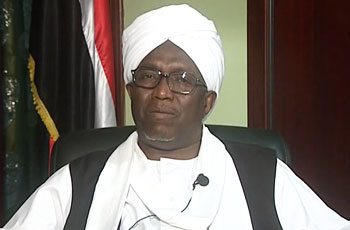Sudan’s ruling NCP reiterates rejection of transitional government
September 13, 2014 (KHARTOUM) – Sudan’s second vice-president and head of the ruling National Congress Party (NCP) political sector, Hassabo Mohamed Abdel-Rahman, has reiterated the government’s rejection of the formation of a transitional government, saying it will not cave in to opposition demands.

“On 1 May [2015 the] president’s (Omer Hassan al-Bashir) power and mandate will expire,” he added.
Sudan’s general elections are set to be held in April 2015 but opposition parties threatened to boycott it saying NCP holds absolute control over power and refuse to make any compromise to end the civil war and allowing public liberties.
Sudan’s National Elections Commission (NEC) had previously said it received requests from political parties last April to delay elections.
NEC chief Mokhtar al-Asam said they received requests for postponing elections from the Popular Congress Party (PCP), led by Hassan al-Turabi, and the National Umma Party (NUP) led by, al-Sadiq al-Mahdi, due to financial difficulties and the country’s present circumstances.
Hassabo also threatened to punish rouge members within his party, calling upon all members to express their views within the NCP institutions.
He underscored that they will not allow party members to express their own views on issues approved by NCP institutions.
“You [party member] have the right to express your opinion within the party institutions not on your own website on the internet or Whatsapp; this is prohibited and we will not allow it,” he said.
The NCP official further said that personal opinion doesn’t hold value when party institutions make a decision on certain issue, emphasising that his party believes in the group more than individuals.
Hassabo said his party membership reached 10 million members, noting that large membership could turn into a weakness factor if it was not properly managed.
The vice-president also warned those whom he described as “serving external agendas” and urged them to liberate themselves from foreign powers, saying the government would offer them guarantees to take part in the national dialogue inside Sudan.
He also described taking strength from foreign powers as a “national betrayal”.
The NCP official said the country enjoys large freedoms and there are 90 political parties, noting this number is unparallelled in any country in the world.
He added that the NCP seeks to establish freedoms that are founded on national principles not agents of foreign countries and pointed out that his party managed to thwart all conspiracies for 25 years.
The vice president described the NCP as the “safety valve” for Sudan, saying it is an Islamic party and all its work is attributable to Allah (God).
KHARTOUM, JUBA RELATIONS
Abdel-Rahman said that Khartoum seeks to maintain safe neighbourhood with Juba, stressing Sudan’s keenness to implement cooperation agreements signed between the two countries.
He also said Sudan supports political stability in South Sudan because Juba represents the strategic depth of Khartoum and vice versa.
South Sudan seceded from Sudan on 9 July 2011 following a referendum on whether the semi-autonomous region should remain a part of the country or become independent. 99% of Southern voters chose independence.
In September 2012, both Sudan and South Sudan signed a series of cooperation agreements, which covered oil, citizenship rights, security issues, banking, border trade among others.
In March 2013, the two countries signed an implementation matrix for these cooperation agreements.
US SANCTIONS
The vice-president said the Sudanese private sector managed to evade sanctions imposed by the United States on Sudan, adding that business leaders in the US are pressing Congress to lift these sanctions.
He noted that more than 50 US companies did not adhere to these sanctions.
Washington imposed economic and trade sanctions on Sudan in 1997 in response to its alleged connection to terror networks and human rights abuses. In 2007 it strengthened the embargo, citing abuses in Darfur which it labelled as genocide.
However, in 2010 the US announced it was easing sanctions on agriculture equipment and services which allowed half a dozen companies to obtain export licenses.
Sudan has also been on the US list of states that sponsor terrorism since 1993, even though the two countries have strengthened their counterterrorism cooperation since the September 2001 attacks on Washington and New York.
(ST)
